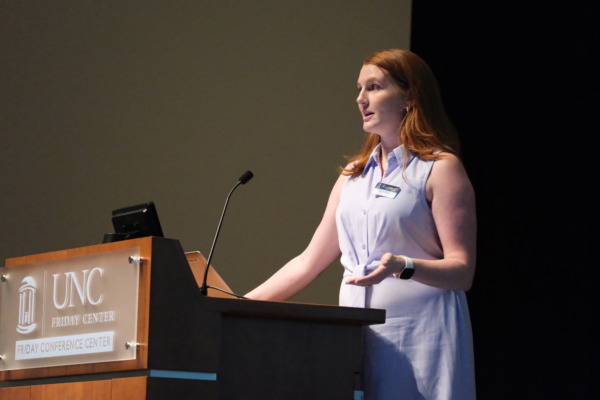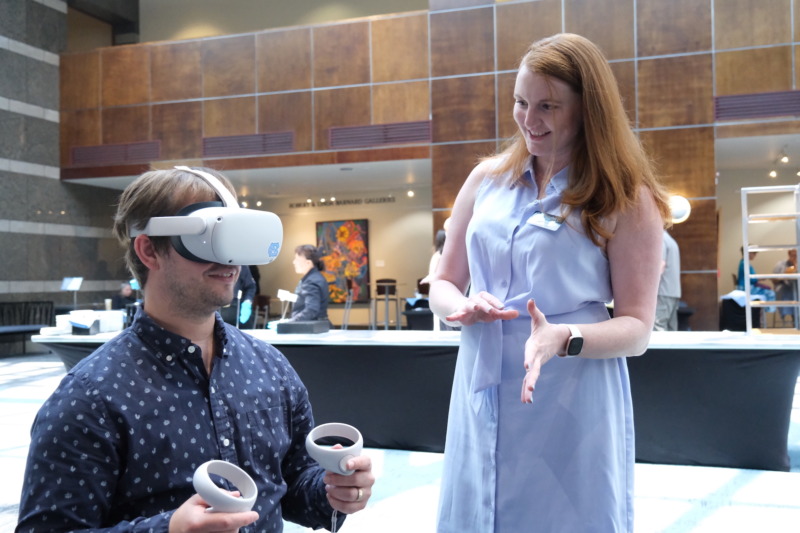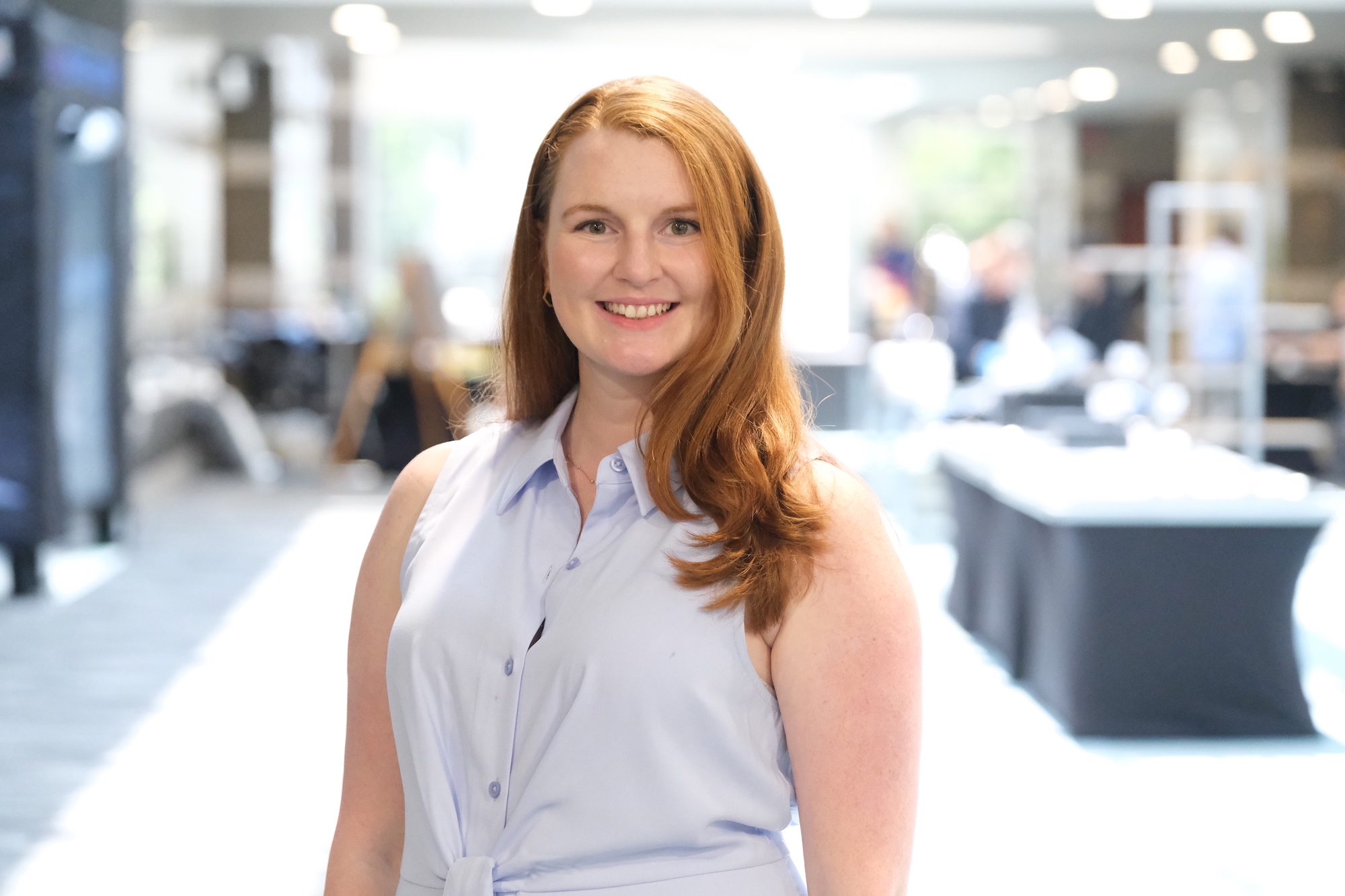Dedicated to driving transformative change in educational innovation, Grace Willard, a 2023 graduate of the UNC School of Education’s Master of Arts in Educational Innovation, Technology, and Entrepreneurship (MEITE) program, is utilizing emerging technologies to advance equity-focused educational experiences across sectors.
With funding from EY, and in collaboration with UNC Kenan-Flagler School of Business and UNC Blue Sky Innovations, Willard and a team of UX/UI designers developed a virtual reality diversity training simulation aimed at improving interpersonal skills acquisition and addressing issues around diversity, equity, and inclusion in the workplace.
With a bachelor’s and master’s degree in elementary education from the University of Florida, Willard brings an educational foundation to her work. Her background in education, coupled with her MEITE program experience, has cultivated a skill set that enables her to strategically integrate technology and innovation into educational practices, fostering an environment of equity, inclusivity, and belonging in the field.
“We wanted to craft an experience where learners felt motivated to change workplace behaviors and build empathy for those around them,” Willard said. “The focus was not on just creating the same product that focuses on definitions, but rather to create an experience in which the user felt some sort of motivation to change their behaviors in the workplace.”
Willard’s inspiration for these simulations was cultivated during her internship with UNC Blue Sky Innovations. In the summer of 2022, she and a team began conceptualizing how virtual reality could provide an immersive learning tool for diversity training and saw an opportunity to create something more impactful than typical online training modules. The simulations provide a context for improving inclusive behaviors to help ensure equitable treatment and to offer practice identifying and responding in varying workplace scenarios.
To bring the product to life, Willard crafted the simulation’s educational aspects — from researching organizational behaviors, gaps in interpersonal skills in the workplace, and identifying learning objectives to writing storylines portrayed by professional actors. She worked alongside subject matter experts within diversity, equity, and inclusion to ensure the scenarios accurately depicted real workplace conflicts and unconscious biases.
“I served as both the instructional designer and an educational producer on set — overseeing the filming and setup while ensuring the storyline aligned with our goals,” Willard said. “We started by identifying the skills we wanted learners to acquire through the virtual reality experience to support DEI goals in the workplace. Recognizing that virtual reality enables different types of data collection and immersive experiences compared to web or in-person role playing, we tailored the scenarios accordingly.”
After piloting the initial simulation in fall 2022, Willard and her collaborators produced multiple immersive training episodes. The team filmed the scenarios to maximize emotional impact and provide opportunities for learners to navigate difficult conversations from varying first-person perspectives. The team also conducted user testing to refine the technology and make the simulations easily accessible.
“Developing virtual reality requires technical programming skills that I’m continuing to build,” Willard said. “I focused on bringing my instructional design and user experience knowledge to complement the developers’ coding expertise. This collaboration enabled us to capitalize on everyone’s strengths.”
Catalyst for change and innovation

Beginning her career as a teacher and later moving into the customer service industry, Willard has spent more than seven years studying customer needs, diverse populations and their experiences, and insights into learning styles that communicate complex ideas. Driven to identify challenges surrounding EdTech and understand where problems arise, Willard used these skills to design human-centered solutions to make a difference.
“In my interactions with others, I often found that people wanted to learn new skills but felt they didn’t have the time or that the skills were too technical for them to master,” Willard said. “I realized that taking the time to learn new technical programs would allow people to become more skilled in their jobs and open up opportunities for advancement.”
Motivated to harness her skills for a career in educational technology design, Willard pursued a career shift by enrolling in the MEITE program.
After starting the program in January 2022, Willard refined her skillsets to enhance the structure of her product and communicate its functions across disciplines. Willard also valued gaining insights into the field of educational innovation and garnering the necessary tools to effectively develop her simulation through partnerships with subject matter experts.
“The biggest takeaway from MEITE has been developing the ability to advocate for effective educational practices,” Willard said. “Working with Dr. Cherner and the cohort fostered this skill. We all came from different backgrounds and perspectives, which allowed us to explain research and theories in new helpful ways. This led to insightful conversations and improved product development.”
Willard’s coursework within the MEITE program and her internship with UNC Blue Sky Innovations served as avenues for her to better understand how to apply theories to product development and experience the full product lifecycle.
Willard also relied on the experiences and perspectives of her peers.
“Many parts of the program provided hands-on experiences grounded in research, along with opportunities to talk through implementation and fail without judgment,” Willard said. “This experience-based approach was invaluable.”
This summer, the MEITE program hosted its 2023 Innovation Showcase and AI Forum on Education. During this event, students presented their projects and innovations and panelists from varying industries shared insights about the future of education and developments in EdTech and artificial intelligence (AI).
After taking part in the innovation showcase, Willard reflected on her experience in MEITE and felt a sense of pride in what she and her peers had accomplished throughout the program. Through the program’s collaborative nature, Willard was inspired to grow as an innovator to leverage her learnings from the program to develop solutions aimed at positively impacting communities and organizations through educational technology.
“It was great to showcase what I had talked about in class for months,” Willard said. “It was amazing to see the creative solutions and projects everyone developed. The event let us celebrate our collective wins.”
Fostering collaboration and equity-focused solutions
Since graduating from the MEITE program in summer 2023, Willard and the simulation team continue to develop episodes for use at Kenan-Flagler and partnering organizations.
Additionally, Willard and her team are working to enhance the accessibility of the simulation for a wider audience. Now, the team is pitching this product to clients to support interpersonal skills development in companies of all sizes through the use of virtual reality.
Fueled by her passion for merging education and innovation, Willard aims to persist in showcasing the impact of her virtual reality training simulation — hoping to empower organizations to support equity and inclusive practices across all facets of their operations.
“Technology can help to improve the way that we’re either providing instruction or helping to transfer these skills,” Willard said. “Whether they’re soft skills or hard skills, we can transform an individual’s experience from feeling discouraged about learning new skills to recognizing areas for growth and building confidence.”
This fall, Willard will embark on a new journey as an instructional specialist with the UNC Kenan-Flagler Business School. Collaborating with instructional designers, graphic designers, and videographers, Willard will bring a new vision to faculty looking to enhance their courses.
Her knowledge of producing interactive and immersive experiences focused on improving interpersonal skills to better address goals for diversity, equity, and inclusion within organizations is only just the beginning of Willard’s impact on the community.

